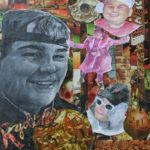
It was the spring of 2011, and Braiheen Jamison was preparing to start his new life. A recent graduate of Glenn Mills High School, Braiheen had a job interview lined up and was expecting a baby boy with his fiancee, Kenya.
“They wanted to get married and have 10 kids,” says his mother, Wendy Jamison. “Braiheen and Kenya knew each other for a long time and were already raising Kenya’s twin boys together. I was so excited to see my son holding his own son for the first time.”
Tragically, Braiheen lost his life to gun violence in North Philadelphia on the night of April 21, 2011—the day before his interview was scheduled with his potential new manager. He was 22 years old. No suspects have been identified, leaving his family and friends devastated with no answer to the question, “Why?” Braiheen leaves behind his mother Wendy, fiancee Kenya, and three children, who carry on Braiheen’s memory and legacy.
“He was my only child,” Wendy says. “No parent should have to lose a child. I still suffer every day.” When she reflects on Braiheen’s childhood, Wendy is flooded by thoughts of her son as a happy boy, playing at home with his grandparents. When they passed away, she noticed a marked change in his behavior. Braiheen began to act out, and at the age of 16, made a decision that would drastically alter his future.
“Braiheen was in high school at the time, hanging out with some friends who got in trouble with the police,” she says. “He took the blame and that’s when he went to Glen Mills.” Braiheen’s decision to assume responsibility for the offense is emblematic of his compassionate nature, which was frequently noticed by others.
Once at the residential school, Braiheen thrived, excelling academically and athletically. His classmates admired his talent on the basketball court, and he developed strong math skills which he used to help his aunt with her taxes.
“When my son came back, he had a different attitude,” explains Wendy. “Braiheen came back a man. He still had a temper on him, but he was more responsible. He knew he had to get himself together because he had a family to take care of. The one thing he didn’t want to do is walk out on his family like his father did.”
But as her son continued to mature and navigate the realities of life, Wendy still worried about him. “Whenever he would say he was running out to the store, my stomach would turn,” she says. “He was my child, and a Black man, and mothers of Black men carry a sense of dread. You’re waiting for the worst to happen.”
Years after Braiheen’s loss, Wendy has become accustomed to a life marked by grief, which she experiences in waves. When she thinks about her son, Wendy sees brief glimpses of his life; the stacks of Timberland boxes to the ceiling in his bedroom, quiet nights at home playing cards together, his never ending appetite for pancakes with maple syrup.
Sometimes the smallest things will trigger her, like seeing an old photo from a party his coworkers threw him.
“He worked the night shift as a home health aide, and they just loved him,” she recounts. “They would tell me he had the best manners. He was hardworking. Braiheen had a phone interview lined up for a new job the day after he died. The manager called me when he didn’t hear from him, and I had to tell him what happened.”
Looking to the future, Wendy is eager to watch Braiheen’s son, who looks and acts just like he did as a child, grow into a young man who would make his father proud.
Resources are available for people and communities that have endured gun violence in Philadelphia. Click here for more information.










Leave a Reply